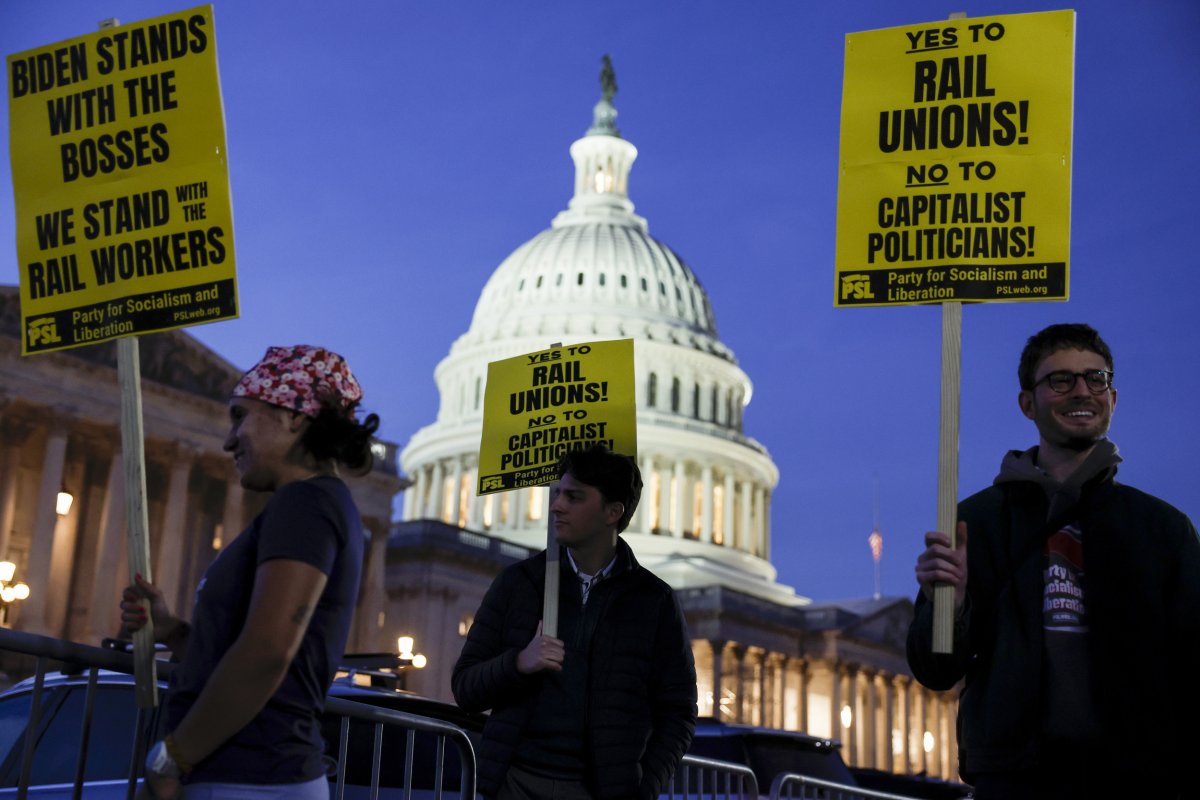After monthslong fears of a national railroad strike, Congress voted Wednesday to force an end to negotiations between the railroads and their unions with a pair of bills designed to draw concessions from both sides.
One bill (which passed with 79 Republican votes and 211 Democratic ones) codified the higher wages the railroads were offering. Members of Congress also voted to implement mandatory sick time as part of the deal, a nod to worker demands for more paid time off that railroads were unwilling to relent on.
That successful amendment, sponsored by Democratic Representative Peter DeFazio and independent Senator Bernie Sanders, came on the heels of bipartisan criticism of President Joe Biden's support of a deal without concessions for paid time off, a deal-breaker that earned scorn from progressives like Alexandria Ocasio-Cortez alongside conservatives like Missouri Senator Josh Hawley.
Florida Senator Marco Rubio tweeted Tuesday he "will not vote to impose a deal that doesn't have the support of the rail workers."
After all the statements from Republicans over the past two days, the @BernieSanders / @RepPeterDeFazio amendments for paid sick leave for Railroad Workers should get an overwhelming YES vote. Workers are watching.
— Sara Nelson (@FlyingWithSara) November 30, 2022
Ultimately, all but three Republican members of Congress—who, notably, have unlimited sick days and all 10 federal holidays off per year—still voted against it.
Internally, the result was largely expected. House Minority Leader Kevin McCarthy indicated to reporters prior to the vote few Republican members were expected to vote in favor of increasing paid time off.
But outwardly, it's not clear why. So far, no Republicans have offered a public rationale for rejecting the deal, nor is it clear whether they opposed the concept of sick time or congressional intervention in railroad workers' efforts to negotiate the deal for themselves.
In early negotiations, the unions requested 15 days of sick leave, while the resolution adopted Wednesday notably had just seven. Numerous Democrats also voted against the larger bill to avert the strike, calling the compromise a betrayal of workers' desire to negotiate a contract on their terms.
However, the fact no Democrats voted against the sick time provision signaled to some that Republicans were voting to prevent workers from obtaining benefits they themselves have: namely, the ability to take time off work whenever they feel the need.

In an earlier vote in the Senate this year, North Carolina Republican Richard Burr and Mississippi Republican Roger Wicker introduced a resolution intended to resolve the strike that did not include provisions for sick leave, earning scorn from Sanders in a speech on the Senate floor. (The resolution failed.)
The disparity between railroaders and members of Congress was visibly on display on social media after the vote.
Notably, a Politifact examination of a Facebook post several years ago alleging similar claims determined there is no limit on sick days or time off for members of Congress, while a Bureau of Labor Statistics report from 2020 found the average private industry worker received an average of eight paid holidays, seven paid sick leave days and 11 paid vacation days per year after one year of work.
Did you know?: members of Congress get unlimited paid sick leave. pic.twitter.com/CChrag8Jqr
— BMWED (@BMWEDIBT) November 30, 2022
And while railroaders get anywhere between three to four weeks of paid vacation and over 10 personal leave days per year, many do not have the flexibility to use them the way people in other industries—like Congress—typically do.
"The 'working class party' strikes again," Justin Baragona, a media reporter for the Daily Beast, tweeted following the vote.
The "working class party" strikes again. https://t.co/1aHBzy38e0
— Justin Baragona (@justinbaragona) November 30, 2022
Uncommon Knowledge
Newsweek is committed to challenging conventional wisdom and finding connections in the search for common ground.
Newsweek is committed to challenging conventional wisdom and finding connections in the search for common ground.
About the writer
Nick Reynolds is a senior politics reporter at Newsweek. A native of Central New York, he previously worked as a ... Read more
To read how Newsweek uses AI as a newsroom tool, Click here.








